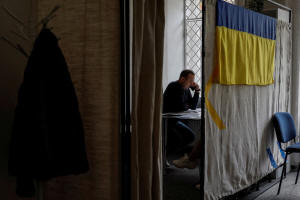Rising domestic violence is a hidden front in Ukraine's war
 Send a link to a friend
Send a link to a friend
 [August 03, 2023]
By Layli Foroudi [August 03, 2023]
By Layli Foroudi
DNIPRO, Ukraine (Reuters) - When the body of 34-year-old Liubov
Borniakova was found in her home in the city of Dnipro in central
Ukraine in January, it was marked with 75 bruises, according to the
coroner's report.
Her husband, Yakov Borniakov, had been laying low inside their apartment
during the previous month, after deserting from the army, according to
Borniakova's aunt and a neighbor. He got drunk and beat Borniakova
repeatedly during the two weeks before her death, they told Reuters.
"There was simply no place on her that was left alive," said Kateryna
Vedrentseva, the aunt, who said she arrived at Borniakova's home hours
after her death in the night of Jan. 8.
"Her arms were beaten, her head, her legs, everything."
Reuters was unable to reach Yakov Borniakov, his lawyer or his family
for comment. A spokesperson for Dnipro police said a criminal
investigation into Borniakova's death was ongoing but declined to
provide further details.
Registered cases of domestic violence in Ukraine initially fell after
Russia invaded in February 2022, as millions of people fled the
fighting.
But, as families have returned to their old homes or re-settled in new
ones, cases have soared this year, according to previously unreported
national police data reviewed by Reuters.
In the first five months of this year, registered cases jumped 51%
compared with the same period of 2022, the data showed. They were over a
third higher than the previous record in 2020, which experts had linked
to pandemic lockdowns.
More than a dozen officials and experts working in the sector told
Reuters the increase was a result of rising stress, economic hardship,
unemployment and trauma related to the conflict. In the vast majority of
cases the victims are women, they said.
"(The rise) is because of psychological tension and because of a lot of
difficulties. People lost everything," Ukraine's commissioner for gender
policy, Kateryna Levchenko, told Reuters in an interview in May.
Police registered 349,355 cases of domestic violence from January to May
2023, compared with 231,244 over the same period in 2022 and 190,277 in
the first five months of 2021, the data showed.
Most of the experts and professionals in the field told Reuters they
fear the problem will worsen as the war persists and will endure long
after the conflict ends due to traumatized troops returning from the
front.
CENTRAL HUB
Dnipro has become a transit point for people fleeing occupied areas and
fighting to the east and south.

After opening in September, a relief centre there run by the government
and United Nations Population Fund (UNFPA) for survivors of domestic
violence had provided support to 800 people, mostly women, as of
mid-May.
Of that number, only around 35% filed complaints with the police,
according to a case worker at the centre – suggesting, as experts and
professionals in the field say, that domestic violence could be more
widespread than police data indicates.
Police in Dnipro did not respond to a request for comment on the data.
Psychologist Tetyana Pogorila, who works at the centre, said that, for
people displaced to Dnipro by the war, being in an unfamiliar place made
some victims of domestic violence more dependent on their abusers.
"People arrive and the family might be living together in one room,"
Pogorila said. "Some find work, some don't and so their financial
situation deteriorates. Add this to the global situation of the county
and anxiety; this increases stress and conflict."
State resources have also been stretched by the war.
Levchenko, the commissioner for gender policy, said that some women's
shelters have been repurposed to house people displaced by fighting and
some of the state budget allocated for gender-based violence was
redirected to defense spending.

[to top of second column]
|

A lawyer of the Survivor Relief Center
talks to a client at the centre in Dnipro, Ukraine, May 10, 2023.
REUTERS/Alina Smutko

The funding allocation dropped to 4.2 million euros this year from
around 10 million euros in 2021, she added.
Yulia Usenko, head of the Department for the Protection of
Children's Interests and Combating Violence at Ukraine's General
Prosecutor's Office, said law enforcement agencies had been alerted
to the potential issues around traumatized troops returning from the
front.
The office created a unit to oversee domestic violence court
procedures in February, Usenko said.
But the lack of funds has social service workers worried.
"We are expecting a very high rate of violence," said Lilia Kalytiuk,
director of the Dnipro centre for social services, which runs a
shelter for refugees.
HISTORY OF VIOLENCE
Borniakov deserted the army in November, documents reviewed by
Reuters show. He returned to Dnipro, where he started drinking
alcohol at home and beating Borniakova, who stopped leaving the
house, according to Olga Dmitrichenko, the neighbor.

In the days before her death, Borniakova planned to leave for Lviv,
a city in western Ukraine, but "she didn't make it," said
Dmitrichenko: "I told her: 'Leave! Leave!'"
Borniakova's three children now live with her cousin a short drive
from her grave in Dnipro.
Police had initially closed their investigation into Borniakova's
death after medical experts concluded she had died of heart failure,
according to a police report seen by Reuters dated January 27, 2023.
Family lawyer Yulia Seheda successfully appealed that decision,
arguing the heart attack was induced by intense beating. A court
document dated March 28 showed the criminal investigation into
Borniakova's death had been reopened.
"If we can at least get a charge of domestic violence it will be a
victory," Seheda said, adding that there was still a view among some
judges and police officers that domestic violence was a private
matter to be settled between a couple.
A conviction for domestic violence carries a maximum of just two
years in prison under Ukrainian law; many offenders are fined
between 170 and 340 hryvnia ($5-10) or given a community service
sentence.
Levchenko, the government commissioner, said the police and judicial
system had been reformed since 2015 so that domestic violence was
treated as a crime and dedicated law enforcement services had been
created.
She said an increase in registered domestic violence cases was
partly a reflection that police are giving more attention to the
issue.

Dmitrichenko, the neighbour, said Borniakova never made a formal
complaint against her husband and did not open the door to police
when Dmitrichenko called them in November. Dnipro police did not
respond to questions about the incident, which Reuters couldn't
confirm independently.
The family is currently trying to remove her husband's name from her
gravestone and replace it with her maiden name.
"Her name is Liubov Pilipenko," said Vedrentseva, on a recent visit
to the cemetery.
(Reporting by Layli Foroudi; Additional reporting by Olena Harmash
in Kyiv; Editing by Mike Collett-White and Daniel Flynn)
[© 2023 Thomson Reuters. All rights
reserved.]This material may not be published,
broadcast, rewritten or redistributed.
Thompson Reuters is solely responsible for this content. |